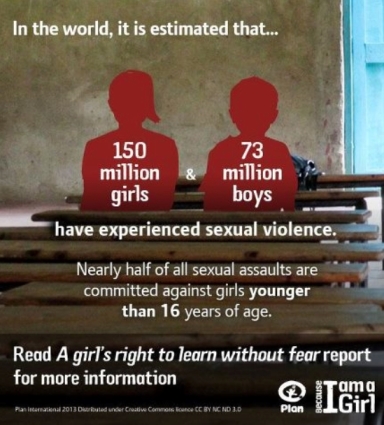Worldwide, 66 million girls are missing out on an education. This new Plan International report, A girl’s right to learn without fear, focuses on one of the major barriers girls face: gender-based violence – sexual, physical and psychological –in and around schools.
Between 500 million and 1.5 billion children experience violence every year, many within school walls. Girls are especially vulnerable to rape, exploitation, coercion and discrimination perpetrated by students and teachers.

A girl’s right to learn without fear looks at the issues and presents solutions which are drawn from existing policy examples, as well as global civil society campaigns, international instruments and the voices of girls themselves.
Plan calls on governments to prioritise actions tied to 8 key principles to ensure that all children can learn free from violence, and that girls benefit from their equal right to education.
1. Comprehensive and integrated action: Governments must adopt a comprehensive, integrated and multi-sectoral action plan to prevent and respond to violence. The plan should be genderresponsive, take into account the diversity of experiences and needs of marginalised girls and boys, and look specifically at the school context.
2. Effective legislation and regulation: Laws must explicitly protect children from violence, ensure accountability, and treat all children equally.
3. Safe and effective reporting and response: Reporting and response mechanisms must be clear, proportionate and consistent with the UN Convention on the Rights of the Child.
4. Evidence-based policy: Policy interventions must be supported by sufficient and credible data on the nature and scope of SRGBV.
5. Well-supported, well-trained personnel: Teachers and school administrators must be well-trained, equipped and supported to prevent and respond to gender-based violence in and around schools.
6. Partnership: Law enforcement, the judiciary, child protection authorities, the transportation sector and civil society organisations must be partners in addressing the vulnerability of children en route to and from school grounds.
7. Inclusiveness: Whole communities, including men and boys, must be involved to change harmful attitudes and shift social norms. Emphasis should be placed on issues of sexual health and sexual rights.
8. Participation: Girls and boys must be recognised as key participants in developing solutions to address SRGBV.

Download summary PDF : English | French | Spanish (2.6 Mb, 8 pages)
Source: Plan International
